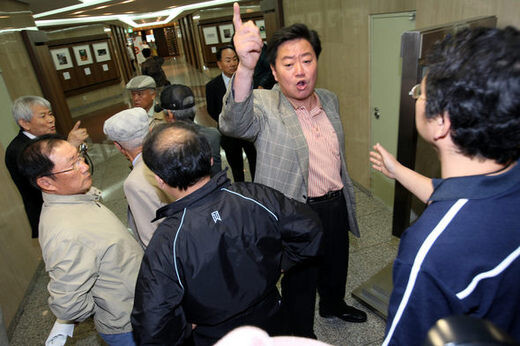hankyoreh
Links to other country sites 다른 나라 사이트 링크
New list of pro-Japanese collaborators sheds new light on history

Two civilian South Korean organizations released on April 29 a list of more than 4,700 people alleged to have been pro-Japanese collaborators during Japan’s 1910-45 occupation of the Korean Peninsula. The list included former President Park Chung-hee, Dong-a Ilbo founder Kim Seong-soo, Chosun Ilbo owner Bang Eung-mo, Ewha Womans University’s first President Kim Hwal-ran and renowned poet Seo Jeong-joo. Immediately after the release, President Lee Myung-bak expressed his opposition to revisiting the collaboration issue, saying, “On the pro-Japan issue, we need to have an eye on keeping a balance between merits and demerits.”
In a press conference, the Institute for Research in Collaborationist Activities and the Committee for Publication of a Directory of the Biographies of Pro-Japanese Collaborators unveiled a list of 4,776 people whom the institute accused of cooperating with Japan during the colonial period. Based on the list, the institute will publish South Korea’s first directory of pro-Japanese collaborators in August. The directory will include biographies of those on the list.
Yoon Gyeong-ro, the head of the committee compiling the information for the directory, said, “We selected people, via a thorough confirmation of historical materials, among those who were confirmed to have caused physical and mental damage to our people by cooperating with the Japanese imperialistic government on the seizure of (Korea’s) sovereignty, colonial rule and war of invasion.”
The latest list was part of the committee’s five-year project to issue a directory of pro-Japanese collaborators. Park Chung-hee, Kim Seong-soo, Bang Eung-mo and Kim Hwal-ran were among 3,009 people included in a first draft of the list released in August 2005. The latest list includes Ahn Eak-tai, the composer of South Korea’s national anthem; Choi Seung-hee, a dancer; Yoon Hae-young, a song writer; Kim Young-il, a writer of stories for young people; and Lee Won-su, a novelist.
Also included in the new list were Yoon Il-seon, the president of The Joseon Independent, a newspaper; Hyeon Sang-yoon, a former president of Korea University; Ko Seung-je, a former professor of Seoul National University; Seo Beom-seok, a former lawmaker; and Ko Jae-phil, a former health minister; as well as two former prime ministers, Jin Eui-jong and Shin Hyeon-hwak.
“We added pro-Japanese collaborators overseas and outside of Seoul to the first-stage list,” said Park Han-yong, a senior researcher on the institute.
The project is meaningful because it completes the procedure of reviewing how Koreans came to work for their Japanese occupiers. The collaboration issue has been one of thorniest controversies in South Korean society since the early 1990s. In 1966, the historian Im Jong-guk began researching the collaboration issue by publishing a book titled, “Theory of Pro-Japanese Literature.” However, it was not until a group of younger historians working with Im launched the institute in 1991 that the work got into full swing. Later, in May 2005, former President Roh Moo-hyun installed a presidential panel, the Presidential Committee for the Inspection of Collaborations for Japanese Imperialism, and in July 2006, the presidential panel launched another body to seize the assets of alleged Japanese collaborators.
After the release of the new list, President Lee said, “We need to view the issue of pro-Japan collaboration in terms of national reconciliation.” In addition, Lee indicated that he may reshuffle presidential committees to inspect the collaboration issue, saying, “Members of the committees were appointed by the previous government. To readjust the committees, the law needs to be changed.”
Over the next 60 days, the civilian institute will review objections from families and followers of those named on the list, after which it will announce the final list. The three-volume directory listing pro-Japanese collaborators and their biographies will be available to the public in August.
Please direct questions or comments to [englishhani@hani.co.kr]
Editorial・opinion
![[Column] Park Geun-hye déjà vu in Yoon Suk-yeol [Column] Park Geun-hye déjà vu in Yoon Suk-yeol](https://flexible.img.hani.co.kr/flexible/normal/500/300/imgdb/original/2024/0424/651713945113788.jpg) [Column] Park Geun-hye déjà vu in Yoon Suk-yeol
[Column] Park Geun-hye déjà vu in Yoon Suk-yeol![[Editorial] New weight of N. Korea’s nuclear threats makes dialogue all the more urgent [Editorial] New weight of N. Korea’s nuclear threats makes dialogue all the more urgent](https://flexible.img.hani.co.kr/flexible/normal/500/300/imgdb/original/2024/0424/7317139454662664.jpg) [Editorial] New weight of N. Korea’s nuclear threats makes dialogue all the more urgent
[Editorial] New weight of N. Korea’s nuclear threats makes dialogue all the more urgent- [Guest essay] The real reason Korea’s new right wants to dub Rhee a founding father
- [Column] ‘Choson’: Is it time we start referring to N. Korea in its own terms?
- [Editorial] Japan’s rewriting of history with Korea has gone too far
- [Column] The president’s questionable capacity for dialogue
- [Column] Are chaebol firms just pizza pies for families to divvy up as they please?
- [Column] Has Korea, too, crossed the Rubicon on China?
- [Correspondent’s column] In Japan’s alliance with US, echoes of its past alliances with UK
- [Editorial] Does Yoon think the Korean public is wrong?
Most viewed articles
- 1‘We must say no’: Seoul defense chief on Korean, USFK involvement in hypothetical Taiwan crisis
- 2N. Korean delegation’s trip to Iran shows how Pyongyang is leveraging ties with Moscow
- 3‘Weddingflation’ breaks the bank for Korean couples-to-be
- 4Korea sees more deaths than births for 52nd consecutive month in February
- 5[Column] Park Geun-hye déjà vu in Yoon Suk-yeol
- 6Will NewJeans end up collateral damage in internal feud at K-pop juggernaut Hybe?
- 7[Column] Has Korea, too, crossed the Rubicon on China?
- 8Amnesty notes ‘erosion’ of freedom of expression in Korea in annual human rights report
- 9Samsung barricades office as unionized workers strike for better conditions
- 10[Column] The clock is ticking for Korea’s first lady